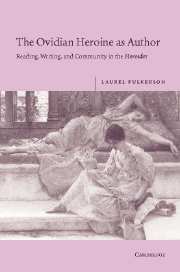Book contents
- Frontmatter
- Contents
- Acknowledgments
- List of abbreviations
- Introduction
- 1 Reading dangerously: Phyllis, Dido, Ariadne, and Medea
- 2 Reading the future?: Hypsipyle, Medea, and Oenone
- 3 Benefits of communal writing: Canace and Hypermestra
- 4 A feminine reading of epic: Briseis and Hermione
- 5 Reading magically: Deianira and Laodamia
- 6 Reading like a virgin: Phaedra and Ariadne
- 7 Caveat lector: thoughts on gender and power
- Appendix: The authenticity (and “authenticity”) of Heroides 15
- Bibliography
- Index
- Index Locorum
Appendix: The authenticity (and “authenticity”) of Heroides 15
Published online by Cambridge University Press: 22 September 2009
- Frontmatter
- Contents
- Acknowledgments
- List of abbreviations
- Introduction
- 1 Reading dangerously: Phyllis, Dido, Ariadne, and Medea
- 2 Reading the future?: Hypsipyle, Medea, and Oenone
- 3 Benefits of communal writing: Canace and Hypermestra
- 4 A feminine reading of epic: Briseis and Hermione
- 5 Reading magically: Deianira and Laodamia
- 6 Reading like a virgin: Phaedra and Ariadne
- 7 Caveat lector: thoughts on gender and power
- Appendix: The authenticity (and “authenticity”) of Heroides 15
- Bibliography
- Index
- Index Locorum
Summary
The authenticity of the Sappho letter has been the most seriously questioned of the entire corpus. Because I have some hesitation over certain of its metrical and linguistic difficulties, I am unwilling to treat Heroides 15 within the compass of this book. On the other hand, Sappho's presence among the women of the Heroides, if indeed she belongs there, would have much to contribute to the purposes of this study. I have therefore chosen to treat Heroides 15 separately, in order to offer a brief outline of ways the Sappho letter intersects with my focus on the intratextuality of the corpus.
Those who have concentrated their energies on the literary aspects of this poem have come up with a variety of interpretations; I will summarize only those most influential on my reading. Baca sees the letter as a kind of apologia (Ovid's) for not writing lyric poetry (1971: 35). Jacobson's interpretation of the letter suggests that Sappho is a poet first and foremost, and a lover only incidentally; for him the focus of Heroides 15 on the intricacies of poetic composition shows Sappho to be an artist fully conscious of her reputation, indeed more interested in it than in her lover Phaon (1974: 287–97). Heroides 15 then becomes a parody of the “persona of the lover-poet,” for whom love is a prerequisite for poetry (ibid. 297–8).
Information
- Type
- Chapter
- Information
- The Ovidian Heroine as AuthorReading, Writing, and Community in the Heroides, pp. 152 - 158Publisher: Cambridge University PressPrint publication year: 2005
